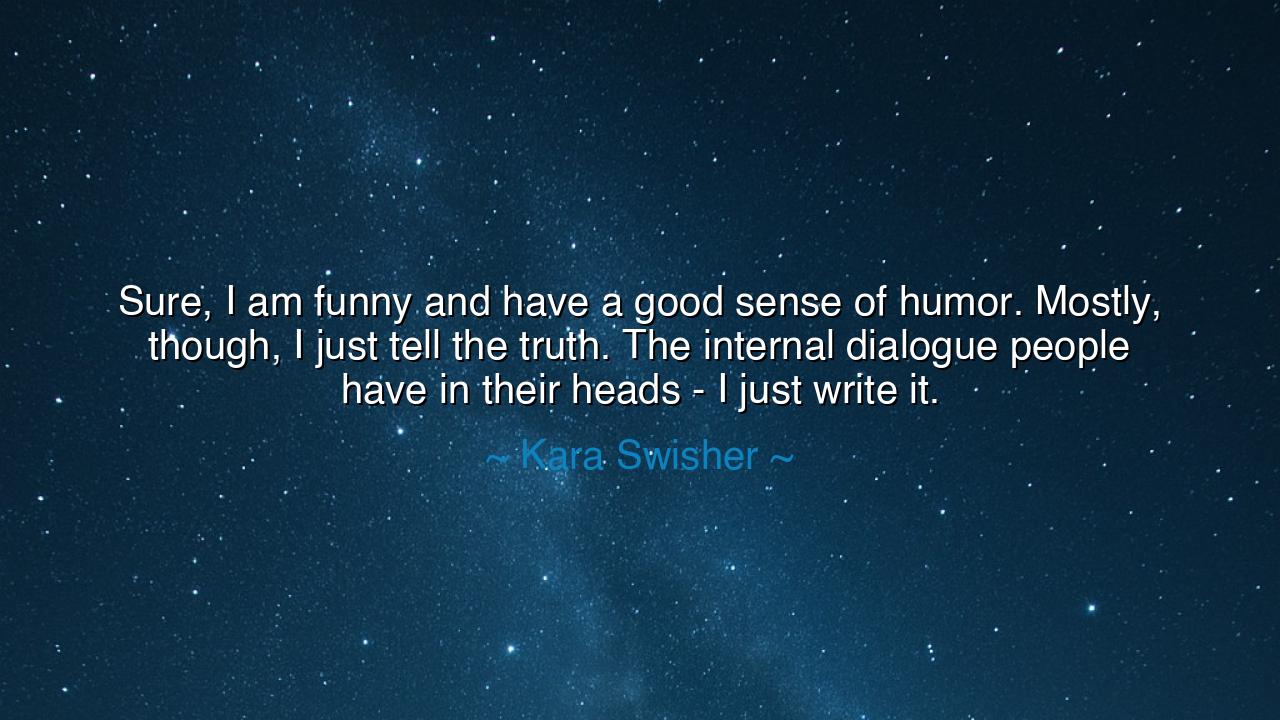
Sure, I am funny and have a good sense of humor. Mostly, though
Sure, I am funny and have a good sense of humor. Mostly, though, I just tell the truth. The internal dialogue people have in their heads - I just write it.






When Kara Swisher said, “Sure, I am funny and have a good sense of humor. Mostly, though, I just tell the truth. The internal dialogue people have in their heads — I just write it,” she was not boasting of wit, but revealing the essence of authentic expression. Her words peel back the veil that separates performer from observer, writer from reader. What she describes is not the art of invention, but the art of revelation — the courage to speak aloud what others only dare to think. In this, her humor becomes something sacred, not a mask for entertainment, but a weapon of truth, sharpened by honesty and delivered with grace.
The origin of this quote lies in Swisher’s long career as one of journalism’s most fearless voices. Known for her directness, she has interviewed the titans of technology and power — from Steve Jobs to Elon Musk — with the same unflinching gaze. Her humor, often dry and cutting, is not a performance but a reflection of her deeper commitment to clarity. She has mastered what few dare attempt: to transform truth itself into art. In her own words, the “internal dialogue” — those secret thoughts, those quiet judgments and unspoken observations — become her material. What others hide for politeness or fear, she brings into the open. And therein lies her power: her comedy and commentary spring from honesty, not embellishment.
To understand her meaning, one must look to the ancient lineage of truth-tellers. In every age, there have been those who hold a mirror to society, revealing its absurdities with laughter. The Greek philosophers understood this balance well. Socrates, though not a comedian, was often accused of irony — of making men laugh at their own ignorance through simple questions. His humor was subtle, born from truth. The same spirit guided Diogenes the Cynic, who mocked the pretense of the powerful not through jest alone, but through brutal honesty. When Alexander the Great stood before him and asked if there was anything he could do for him, Diogenes merely said, “Yes — stand out of my sunlight.” It was humor born of integrity, laughter sharpened by truth. In the same way, Swisher’s humor is not an escape from seriousness, but its natural expression.
The power of her statement lies in the union of truth and relatability. She speaks the words that live in the minds of others, but that remain unspoken out of fear or social restraint. This is why her writing feels alive — because it echoes the voice inside the reader’s own heart. When she says she “just writes the internal dialogue,” she names the writer’s most ancient role: to give voice to the silent chorus of humanity. Every reader carries within them a thousand thoughts they cannot express — thoughts of doubt, of longing, of irony, of judgment. The writer, when true, becomes their vessel. This is what separates the honest from the performative: while others decorate words to impress, the true artist uncovers what was already there, waiting to be said.
It is not easy to live or write this way. To tell the truth is to risk rejection, for truth is not always pleasing. It cuts, it exposes, it challenges illusions. Yet the ancients knew that no virtue was more divine. Solon, the lawgiver of Athens, said, “Speech is the image of the soul.” Thus, when one speaks truth, one reveals not only the world’s condition but one’s own. Swisher’s humor, like that of the prophets and poets before her, is an act of courage. It defies the comfort of conformity. For truth-telling is not rebellion for its own sake — it is the cleansing fire that makes renewal possible.
Consider also the legacy of Mark Twain, that great American humorist. He, too, was accused of being merely “funny.” But beneath his laughter lay the sting of truth — the hypocrisy of society, the folly of pride, the blindness of prejudice. Twain, like Swisher, did not invent the human comedy; he merely reflected it. His words endure not because they entertained, but because they revealed. He wrote what others thought and feared to say, and in doing so, turned laughter into liberation. To “write the internal dialogue,” then, is not merely an artistic choice; it is a moral one — to bring hidden thoughts into the light, to make the private universal.
So, my children, take this lesson from Kara Swisher and all who have walked this path: truth is the root of both wisdom and humor. To be funny without truth is to be hollow; to be truthful without grace is to be harsh. But when honesty and wit join hands, they become instruments of revelation. Speak what is real, not what is safe. Write what others only think, and you will awaken something sacred — recognition. For every soul longs to be seen, and the truth, spoken with courage, makes that possible.
Thus, let this teaching endure: do not fear the truth, and do not polish it beyond recognition. The laughter it brings may sting, but it also heals. Whether through humor, art, or speech, be the one who says aloud what others keep silent. For in that act, you honor both yourself and the world — and perhaps, like Swisher, you will find that the deepest form of comedy is not exaggeration, but honesty delivered without fear.






AAdministratorAdministrator
Welcome, honored guests. Please leave a comment, we will respond soon